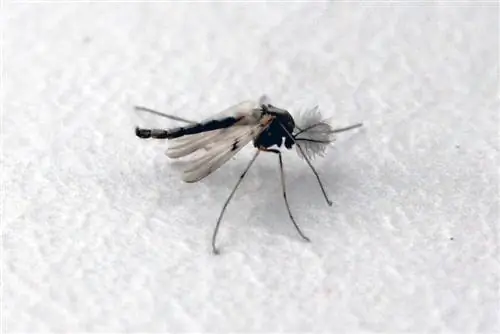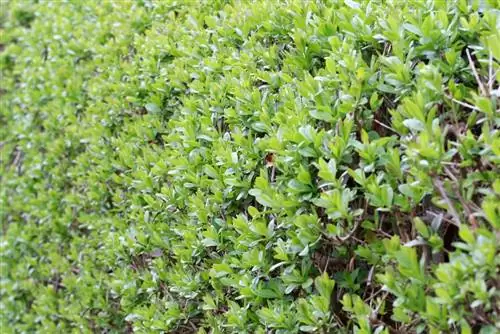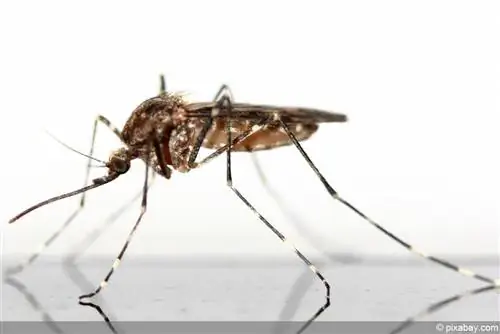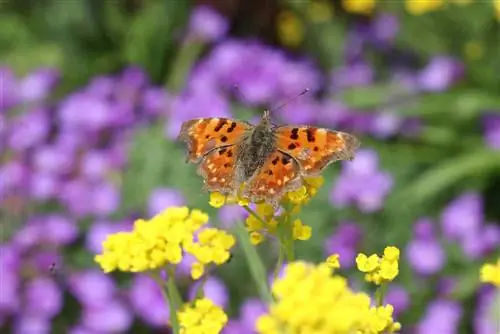- Author admin caroline@plants-knowledge.com.
- Public 2023-12-17 03:39.
- Last modified 2025-01-24 12:45.
Contrary to many opinions, mosquitoes (Nematocera) hibernate, although not all of them. This depends primarily on their gender and the respective stage of development. While the males die in autumn, the females prepare for winter from around mid-October. They have already laid their eggs, which, together with the larvae, await the next summer in the icy cold. Sometimes people are not safe from a mosquito bite, even in sub-zero temperatures. The following explains exactly how and why mosquitoes spend the winter.
Winter Myth
It is often assumed that mosquitoes only survive in warm climates. This is due to the fact that the number of Nematocera usually decreases significantly in autumn. This is true so far, but that is because the male mosquitoes die and only the females remain. These are also the ones that sting. While the male animals feed themselves purely on plant juices, the females need additional protein, especially after fertilization, which they absorb from human or animal blood.
In Siberia, female mosquitoes can even survive temperatures below 50 degrees Celsius in some places. Depending on the development of the mosquito, they have different strategies to survive the cold season alive in order to actively search for food again the following spring.
The number of stinging insects depends less on the cold outside temperatures and more on the spring. The wetter it is, the more they multiply and buzz en masse through the summer and Germany's gardens or apartments.
Wintering
The mosquitoes have three strategies that allow them to survive the winter even in extremely sub-zero temperatures:
- as eggs
- as larvae
- as a female adult mosquito
In the final act of the male mosquitoes living in late summer or autumn, they fertilize the females. These usually lay their eggs where the larvae that develop from them are able to survive in the winter.
Eggs and larvae have excellent chances of survival during overwintering, as they hardly offer any risk of frostbite due to the low water content in winter. The adult mosquitoes then go looking for their suitable winter quarters.
Winter quarters
From autumn onwards, mosquitoes look for a place to overwinter. They prefer cool, dry winter quarters that are safe from predators, which is why they like to use open windows and doors, especially in autumn, to find an optimal place to overwinter in cellars, garages, cattle sheds or garden sheds. There they fall into hibernation in cold ambient temperatures. In water, the eggs usually survive the winter cold in mud or mud, for example in a pond. They also find optimal winter quarters in rain barrels. Here they are deposited by the mother animals.
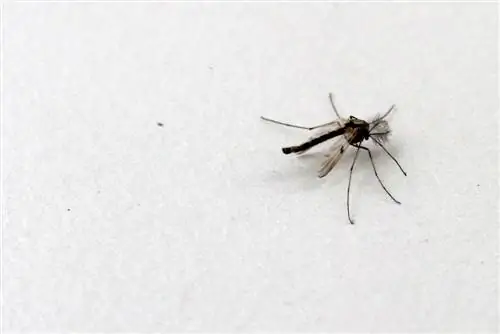
The larvae settle below the surface of the water. Their breathing tube extends through the surface of the water and allows them to absorb oxygen even when the water is frozen over. provided that the ice is only created afterwards. However, if the water is already completely covered with ice before the larvae can point their breathing tube upwards, they will not survive for long. Otherwise, like adult mosquitoes, they spend the cold winter months in hibernation. A completely frozen body of water also means certain death for the eggs due to a lack of oxygen.
Tip:
To curb a mosquito plague in the following year, you should let water containers freeze and in ponds simply use reed tubes that reach almost to the bottom of the pond, which freeze all around but offer oxygen to other ecologically valuable animals under the water.
Winter torpor
If the outside or ambient temperatures drop to five degrees Celsius or less, mosquitoes and their larvae enter the hibernation stage.
Cold protection
The body of the Nematocera gives the insects special protection that prevents them from freezing. As cold-blooded animals, their bodies react to the cold temperatures by also reducing their own body temperature. At the same time, mosquitoes, as they are also called, excrete increased body fluids in order to minimize the potential for frostbite. In addition, more water binds with protein, which subsequently increases the s alt content in the body. Furthermore, a natural cold protection based on glycerin forms in the blood, as is also used in water antifreeze, for example in vehicles. This means that the blood cannot freeze, as is the case with dogs, for example, as animals that are kept at the same temperature.
Organ functionality
During hibernation, organ activity reduces as body temperature decreases. The body system shuts down evenly to a kind of standby mode and only functions with a minimum level of activity so that important organ functions keep the body alive. This also includes body mobility, which leads to complete rigidity as the ambient temperature decreases. Due to the shut down system with a flattened heart and breathing rate and inability to move, little energy is consumed.
Food supplies
Mosquitoes obtain additional energy for hibernation through increased food intake starting in late summer. This is stored in a fat depot, which can be recognized by the yellowing of the rump. This supplies the mosquito body with the energy it needs, which enables organ functionality during the winter period.
Waking up
If the temperatures rise to between eight and ten degrees Celsius, mosquitoes and their larvae wake up again. This costs them additional energy, which causes them to search for food even in winter and to pursue their stabbing for blood. So it is quite possible that you are not necessarily safe from a mosquito bite in December or January.
It also happens every now and then that mosquitoes don't even go into hibernation because they have chosen a winter quarter that is too warm. As a rule, however, they do not survive the winter season.
Tip:
If you occasionally warm up closed rooms to over ten degrees Celsius, you will break the mosquitoes out of their winter torpor. The increasing energy consumption increases the chance that the mosquitoes that hibernate there will no longer bite you the following year.
End of winter
Depending on how cold or warm the months between February and April are, early spring represents the greatest danger for this type of insect. It is known that winter can strike again badly with icy temperatures at the official start of spring and frosty temperatures are even possible until the Ice Saints in May. While this affects the mosquito eggs less, the mosquitoes and their larvae have far more problems surviving here. Short, sudden drops in temperature do not allow their body's temperature to adjust evenly once they have woken up from winter torpor. This means that your cold protection cannot react as quickly to unexpected frost and the risk of freezing to death increases immensely.
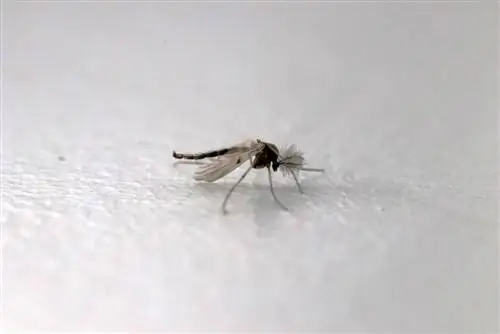
However, this does not apply to mosquito eggs. A sudden frost doesn't bother them because they don't have any water or blood that could freeze.
Since female mosquitoes can lay up to 300 eggs several times in just a few days and begin reproducing in early spring, the mosquito is definitely not threatened with extinction, even despite a possible high death rate due to renewed freezing temperatures after hibernation.
Conclusion
Only female mosquitoes and their eggs and mosquito larvae overwinter, while their male counterparts die before the onset of winter. Most of these insects survive freezing temperatures in hibernation and the eggs are almost completely frost-resistant. A warm, humid spring offers excellent conditions for large numbers of these biting pests, as the overwintered mosquitoes can reproduce optimally here. The tips mentioned help to make the winter more difficult for these females and their offspring in order to prevent or at least significantly minimize mass reproduction in the following year.

